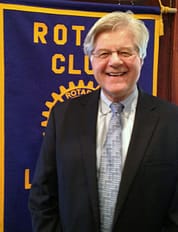 David Ekerdt, professor of sociology and director of the Gerontology Center at KU, reminded the members of Lawrence Central Rotary that Social Security was developed as an insurance program in 1935 to prevent people from falling into poverty. It has contributed significantly to the well-being of the United States populations during the past 74 years: reducing poverty, managing the labor force by providing incentives to retire, enhancing the prosperity of children, and allowing intergenerational relationships to be influenced by affection rather than financial concerns.
David Ekerdt, professor of sociology and director of the Gerontology Center at KU, reminded the members of Lawrence Central Rotary that Social Security was developed as an insurance program in 1935 to prevent people from falling into poverty. It has contributed significantly to the well-being of the United States populations during the past 74 years: reducing poverty, managing the labor force by providing incentives to retire, enhancing the prosperity of children, and allowing intergenerational relationships to be influenced by affection rather than financial concerns.
Social Security protects not only the old from poverty, but also dependents of the deceased and those who are disabled. In Kansas, a half million people, or 18% of the population, are receiving benefits. That number includes 38,000 children.
Ekerdt addressed the controversy concerning Social Security solvency, referencing “The Future Financial Status of the Social Security Program” by Stephen Goss. and “Social Security Modernization” published by the U.S. Senate Special Committee on Aging. Ekerdt explained that Social Security collects its own tax and must pay for itself by law. The program represents 20% of the federal budget. Concerns about exhausting the trust fund in 2033 mean that if no action is taken, recipients will receive 77% on the current dollar.
Why is there a shortfall predicted? Ekerdt points to two reasons: (1) the falling birth rate is falling so that in the future fewer workers will support more recipients; and (2) under-collection of revenue—more individuals are earning large salaries and do not pay Social Security tax on the amount they earn over $117,000. A variety of reforms are under discussion, but in general, they take the form of either decreasing benefits or increasing revenues.
On October 13th Ekerdt will present a six-hour class called The Struggle over Social Security for Osher Lifelong Learning Institute. The class will take place in mid-October at the KU Edwards Campus in Overland Park location.